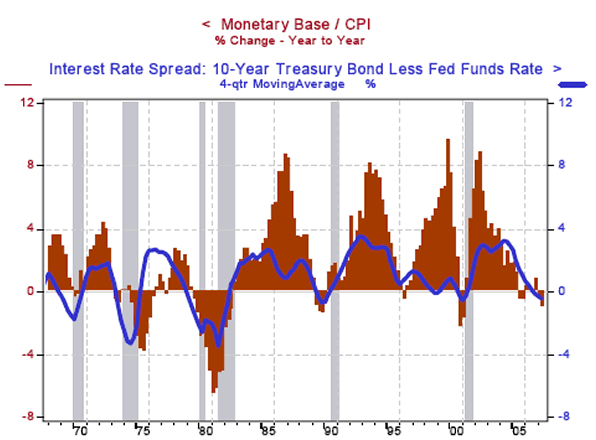You Know Things Are Bad When The WSJ Trots Out Malpass and Wesbury In The Same Week
Economics / US Economy Aug 10, 2007 - 12:40 AM GMTBy: Paul_L_Kasriel
This headline is from an email I received today from a well-known financial journalist noted for her proclivity for identifying "naked emperors." I will address Malpass' errors in another commentary. But in this short note I want to talk to Wesbury's op-ed piece in today's WSJ, "Fair but Unbalanced".
Before countering some of Wesbury's almost perennial happy-talk, let me acknowledge a bit of truth in his essay. The financial media, especially the broadcast financial media, do like to "spice it up," akin to professional wrestling, by having bulls and bears duke it out. After all, as Wesbury indicates, it's all about ratings and ad dollars. Sound bites sell, not analysis. But that's the extent of our agreement.
Wesbury argues that the consensus forecast of professional (and I use the term advisedly) economists is more accurate than that of the lay public. That's kind of like saying that German shepherds are smarter than German shorthaired pointers. That may be true, but in an absolute sense, neither is very bright. To argue that the economy is not in danger of slipping into a recession, as the lay public believes, because the consensus forecast of economists does not call for one is to ignore history. How many times has the consensus forecast of economists called for a recession?
Although the lay public might have predicted eight out of the past four recessions, to paraphrase Samuelson, at least it has predicted some recessions. I am not aware of the consensus of economists' forecasts ever predicting a recession. To Wesbury's credit, he was one of only a handful of economists who predicted the last recession. (See, I'm fair and balanced.) The consensus did not.
To this point, it is interesting to trace the course of the Blue Chip Economic Survey's consensus forecasts of 2001 real GDP. As you may recall, the economy entered a recession in April 2001 - i.e., the prior expansion peaked in March 2001. On an annual average basis, real GDP grew at 0.75% in 2001. In December 2000, the Blue Chip Survey's consensus 2001 real GDP forecast was 3.1%. By March 2001, the Blue Chip consensus forecast for 2001 real GDP growth had dropped down considerably to 1.9%, but that's not a recession forecast.
Wesbury bases his optimistic outlook for the U.S .economy on coincident indicators such as current economic growth and the unemployment rate. To wit, "...the unemployment rate is still just 4.6%, almost a full percentage point below its 20-year average of 5.5% ..." and " ... [a]fter all, the economy is closing in on six straight years of growth and the stock market is up more than 80% since its bottom in October 2002." What was the unemployment rate in December 2000, four months before the peak in that business expansion? 4.0%. By March 2001, the unemployment rate had climbed to 4.3%.
How many years had the economy been expanding before it went into the recession of 2001? Try 10 years. Based on Friday closes, how much was the S&P 500 stock market price index up on March 30, 2001 from its October 12, 1990 low? Try 287%. Wesbury must have been using a different model back in 2000 when he correctly predicted the 2001 recession than he is using currently.
Let me suggest another model that has a better track record in forecasting recessions than either the gaggle of professional economists, including Wesbury, or the lay public. It is the combination of the behavior of a yield spread and the CPI-adjusted monetary base. The yield-spread variable is the difference between the yield on the Treasury 10-year security and the federal funds rate. The monetary base consists of the reserves created by the Federal Reserve for the banking system and the currency held by the public.
As the chart below shows, since 1970, whenever the four-quarter moving average of the yield spread has turned negative and, at the same time , the year-over-year change in the quarterly average of the CPI-adjusted monetary base has turned negative, a recession has occurred. Guess what? In each of the first two quarters of 2007, this combination of a negative yield spread and contracting real monetary base has obtained.
Chart 1

There has been a lot of talk about the quality of the editorial page of the WSJ declining under the Dow-Jones new ownership. The way I see it, the quality of the WSJ's guest economic opinion pieces could not sink to lower levels than this one.
By Paul L. Kasriel
The Northern Trust Company
Economic Research Department - Daily Global Commentary
Copyright © 2007 Paul Kasriel
Paul joined the economic research unit of The Northern Trust Company in 1986 as Vice President and Economist, being named Senior Vice President and Director of Economic Research in 2000. His economic and interest rate forecasts are used both internally and by clients. The accuracy of the Economic Research Department's forecasts has consistently been highly-ranked in the Blue Chip survey of about 50 forecasters over the years. To that point, Paul received the prestigious 2006 Lawrence R. Klein Award for having the most accurate economic forecast among the Blue Chip survey participants for the years 2002 through 2005.
The opinions expressed herein are those of the author and do not necessarily represent the views of The Northern Trust Company. The Northern Trust Company does not warrant the accuracy or completeness of information contained herein, such information is subject to change and is not intended to influence your investment decisions.
Paul L. Kasriel Archive |
© 2005-2022 http://www.MarketOracle.co.uk - The Market Oracle is a FREE Daily Financial Markets Analysis & Forecasting online publication.



